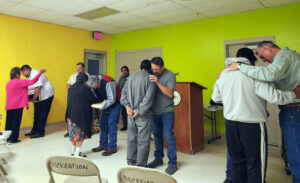
LEXINGTON, Ky. (BP)–A number of Southern Baptist churches are among nearly 170 congregations in the Lexington, Ky., area responding to a call from local government for help in designing welfare reform.
In the past two months various proposals have emerged from 11 church and community forums on ways churches can assist the poor.
Attracting more than 350 people, the “town halls” reviewed options for providing such services as child care, food and clothing assistance, transportation, job banks and low-income housing.
The possibilities of churches networking to supply such assistance has many of the community’s Christians looking for a greater collective witness.
“The church has not been on the cutting edge (of social ministry) because we’ve had the welfare state,” said Craig Loscalzo, pastor of Immanuel Baptist Church. “This may be the greatest time in history for the church to preach the whole gospel.”
“I hope we can work with the community of faith,” added Sandra Williams, director of church and community ministries for the Elkhorn Baptist Association. “I hope our churches feel the need to unite so we can do a much bigger work than if we did it by ourselves.”
Loscalzo and Williams are two of the 28 members of an overarching “Faith and Community Connections” task force organized to help implement the various proposals. The other Southern Baptist pastor in the group is J.R. Lawson of Chevy Chase Baptist Church.
Ginny Ramsey, a member of the Cathedral of Christ the King who helped organize the town halls, said people have set aside their theologies and biases to be part of this effort.
Participants in the meetings showed an amazing spirit of cooperation, she told the crowd at a recent session reviewing the interdenominational effort.
“They said, ‘We’re going to be responsible and make it work. We’re part of this community.’ People want families to be families. They don’t want children going hungry,” she said.
Although Fayette County submits its welfare-reform proposal to the state Jan. 31, social services commissioner Barbara Curry sees the effort as a “work in progress” that will require many months to organize.
Saying she was overwhelmed by the cooperation and commitment churches have shown, the commissioner said she sought the religious community’s involvement because they can offer so many resources.
“This can be the issue that makes us realize we can’t separate ourselves out from each other (on the basis of) public and private, faith and not, rich and poor,” Curry said.
Viola Miller, director of the Kentucky Cabinet for Families and Children, also applauded the faith community’s efforts.
“I’m delighted with the material … generated with the
task force,” she said, noting the complexity of changing the system. “Nobody has done this before. This system has been in place for 60 years.”
To help the task force get started, Fayette County’s social services agency has provided temporary office space and equipment, including a telephone. Three graduate interns will staff the office, according to Katherine Amato-Von Hemert, a professor of social work at the University of Kentucky.
The three Southern Baptists on the panel look for the interdenominational effort to expand individual church ministries by linking them with additional resources.
Immanuel’s Loscalzo said he came home from one meeting with a “sense of vitality” for what can be accomplished. He hopes to see churches become centers of activity throughout the week instead of just Sundays and Wednesdays.
“A church building lends itself to having space for job networks and other things,” he said. “It’s a centralized place where people can gather because we have the space. Small churches can be utilized too.”
Loscalzo said he foresees benefits from a congregation plugging into a wider network. A “Step by Step” program for young mothers, which meets there biweekly, could attract additional support and participation, he noted.
Lawson said he believes there many ways Chevy Chase can assist current welfare recipients, such as helping sponsor child-care clinics, blood drives, tutoring children and developing mentoring relationships.
The current situation is one that should challenge Christians to live out the gospel, Lawson said.
“Churches not only permitted welfare, they welcomed it,” he said. “They haven’t planned to take back over the benevolent acts they were meant to do.
“In many cases, this is a wonderful opportunity to reach those who are unchurched. But often, when we have helped those in need, we give them money or meet a need and we don’t care about their soul. If we’re going to help them we have to do that too.”
Many of the 87 churches in the Elk River association already are involved in ministries ranging from child care to clothing, food and after-school programs, Williams said.
A survey of members’ resources and needs is under way, with the information expected to be useful for the welfare-reform effort. She said she hopes each church will be involved in some aspect.
“I’m excited about what can happen in the future,” Williams said.
However, Loscalzo sees a potential stumbling block if government expects the church to remain silent as it carries out its mission.
“All we do is gospel-aimed,” he said. “Our mandate is to preach the good news, baptize people and help the poor. The mandate upon the church is from Christ himself.”
–30–
















